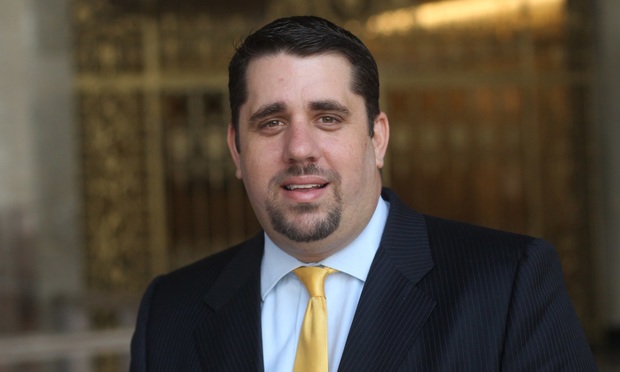Miami Court Wipes Ruling That Found HSBC Forged Mortgage Documents
A state judicial panel remanded the case to the trial court to enter a final judgment of foreclosure.
February 08, 2018 at 03:31 PM
4 minute read

A Florida appellate court vindicated HSBC Bank USA N.A., reversing a Miami-Dade Circuit judge who'd found the lender forged mortgage documents to prosecute a real estate foreclosure.
Citing seven points in its analysis of the trial court's findings, the Third District Court of Appeal Wednesday ruled in favor of New York-based HSBC, and remanded the case to Miami-Dade Circuit Judge Beatrice Butchko to enter a final judgment of foreclosure.
“This is a very disappointing decision, which ignores most of Judge Butchko's groundbreaking ruling,” said Bruce Jacobs, the Miami foreclosure defense attorney who won at trial.
Butchko in April 2016 dismissed HSBC's foreclosure suit against homeowners Joseph and Margaret Buset. In response to an accusation of forgery against Ocwen Loan Servicing LLC, she sided with borrowers who accused the loan servicing company of faking a mortgage assignment for HSBC.
“Judge Butchko found Ocwen and HSBC relied on false testimony, false evidence, violated the court's discovery order and then lied about their violation of that order,” the defense attorney from Jacobs Keeley said. “Judge Butchko found the documents were untrustworthy. She found Ocwen's loan boarding process was a legal fiction.”
Jacobs of Jacobs Keeley in Miami argued at trial that to prove the plaintiff had legal standing to sue, the financial services firm forged documents in 2012 to show the transfer of the debt about seven years earlier from one lender to another.
“They're creating fake evidence of transactions that didn't really happen,” Jacobs told the Daily Business Review after Butchko found the mortgage assignments “never legally occurred.”
The judge found the lender pursued the case with “unclean hands” and lacked competent evidence to support its lawsuit. She also granted the homeowners' request to force the financial institutions to show why she shouldn't punish them for committing a fraud on the court.
But the defense victory fizzled on appeal.
Instead, the court noted multiple missteps and a shift in focus in a dispute that should have ended in the bank's favor. It found the bank never attempted to misrepresent the 2012 mortgage assignment, and that the documents governing the sale of the debt during the last foreclosure crisis allowed for undated, signed and blank endorsements.
“At first blush, this case appears straightforward,” Judge Thomas Logue wrote in a unanimous decision with Judges Robert Luck and Norma Lindsey. “The borrowers stipulated to the note, mortgage and default. … At some point, however, the focus of this case shifted from foreclosure to securitization.”
Securitization refers to the financial services industry's practice of pooling mortgages and other contractual debt, and then selling the revenue streams as securities to third-party investors. It took center stage in the foreclosure case.
According to the appellate ruling, Butchko relied “heavily on expert legal testimony of an out-of-state lawyer who specialized in securitization,” referring to that witness at least seven times in the final judgment. The witness, New York attorney Kathleen Cully, gave her opinion on several issues, including that the promissory note was not negotiable, the bank lacked standing to sue the homeowners, and that the financial institutions violated their pooling and servicing agreement by transferring the debt via an undated and unsigned indorsement.
Allowing that testimony and then emphasizing it in the ruling were missteps that opened the door for reversal on appeal, according to the Third DCA.
“Even if Cully had an expertise in Florida law, the admission of expert testimony on the legal issues central to the case was an abuse of discretion,” Logue wrote for the judicial panel.
The appellate court also disagreed with Butchko on several key points. It found, for instance, that the promissory note was negotiable under Florida law, that the bank did not violate the pooling and servicing agreement and that the mortgage assignment did not destroy HSBC's legal standing to foreclose.
“The Third DCA never ruled on my motion (to) relinquish jurisdiction, to dismiss the appeal as premature, to strike as sham and for sanctions,” Jacobs said. “Instead, they focused on whether the note was negotiable, even though Judge Butchko said negotiability was not a basis for her ruling. … This is just not a fair and impartial analysis of whether the big banks are still engaged in unclean hands in foreclosures.”
Greenberg Traurig attorneys Patrick Broderick, Kimberly Mello, Jonathan Tannen and Vitaliy Kats represented the appellants.
“This case presented multiple issues of significance to the financial services industry,” Broderick said in a statement. “We are pleased that the appellate court found no basis for a finding of unclean hands by our client in the handling of the underlying action.”
This content has been archived. It is available through our partners, LexisNexis® and Bloomberg Law.
To view this content, please continue to their sites.
Not a Lexis Subscriber?
Subscribe Now
Not a Bloomberg Law Subscriber?
Subscribe Now
NOT FOR REPRINT
© 2025 ALM Global, LLC, All Rights Reserved. Request academic re-use from www.copyright.com. All other uses, submit a request to [email protected]. For more information visit Asset & Logo Licensing.
You Might Like
View All
Meta agrees to pay $25 million to settle lawsuit from Trump after Jan. 6 suspension
4 minute read
Executive Assistant, Alleging Pregnancy Discrimination and Retaliation, Sues Florida Healthcare Entrepreneur
3 minute read
Trending Stories
Who Got The Work
J. Brugh Lower of Gibbons has entered an appearance for industrial equipment supplier Devco Corporation in a pending trademark infringement lawsuit. The suit, accusing the defendant of selling knock-off Graco products, was filed Dec. 18 in New Jersey District Court by Rivkin Radler on behalf of Graco Inc. and Graco Minnesota. The case, assigned to U.S. District Judge Zahid N. Quraishi, is 3:24-cv-11294, Graco Inc. et al v. Devco Corporation.
Who Got The Work
Rebecca Maller-Stein and Kent A. Yalowitz of Arnold & Porter Kaye Scholer have entered their appearances for Hanaco Venture Capital and its executives, Lior Prosor and David Frankel, in a pending securities lawsuit. The action, filed on Dec. 24 in New York Southern District Court by Zell, Aron & Co. on behalf of Goldeneye Advisors, accuses the defendants of negligently and fraudulently managing the plaintiff's $1 million investment. The case, assigned to U.S. District Judge Vernon S. Broderick, is 1:24-cv-09918, Goldeneye Advisors, LLC v. Hanaco Venture Capital, Ltd. et al.
Who Got The Work
Attorneys from A&O Shearman has stepped in as defense counsel for Toronto-Dominion Bank and other defendants in a pending securities class action. The suit, filed Dec. 11 in New York Southern District Court by Bleichmar Fonti & Auld, accuses the defendants of concealing the bank's 'pervasive' deficiencies in regards to its compliance with the Bank Secrecy Act and the quality of its anti-money laundering controls. The case, assigned to U.S. District Judge Arun Subramanian, is 1:24-cv-09445, Gonzalez v. The Toronto-Dominion Bank et al.
Who Got The Work
Crown Castle International, a Pennsylvania company providing shared communications infrastructure, has turned to Luke D. Wolf of Gordon Rees Scully Mansukhani to fend off a pending breach-of-contract lawsuit. The court action, filed Nov. 25 in Michigan Eastern District Court by Hooper Hathaway PC on behalf of The Town Residences LLC, accuses Crown Castle of failing to transfer approximately $30,000 in utility payments from T-Mobile in breach of a roof-top lease and assignment agreement. The case, assigned to U.S. District Judge Susan K. Declercq, is 2:24-cv-13131, The Town Residences LLC v. T-Mobile US, Inc. et al.
Who Got The Work
Wilfred P. Coronato and Daniel M. Schwartz of McCarter & English have stepped in as defense counsel to Electrolux Home Products Inc. in a pending product liability lawsuit. The court action, filed Nov. 26 in New York Eastern District Court by Poulos Lopiccolo PC and Nagel Rice LLP on behalf of David Stern, alleges that the defendant's refrigerators’ drawers and shelving repeatedly break and fall apart within months after purchase. The case, assigned to U.S. District Judge Joan M. Azrack, is 2:24-cv-08204, Stern v. Electrolux Home Products, Inc.
Featured Firms
Law Offices of Gary Martin Hays & Associates, P.C.
(470) 294-1674
Law Offices of Mark E. Salomone
(857) 444-6468
Smith & Hassler
(713) 739-1250







